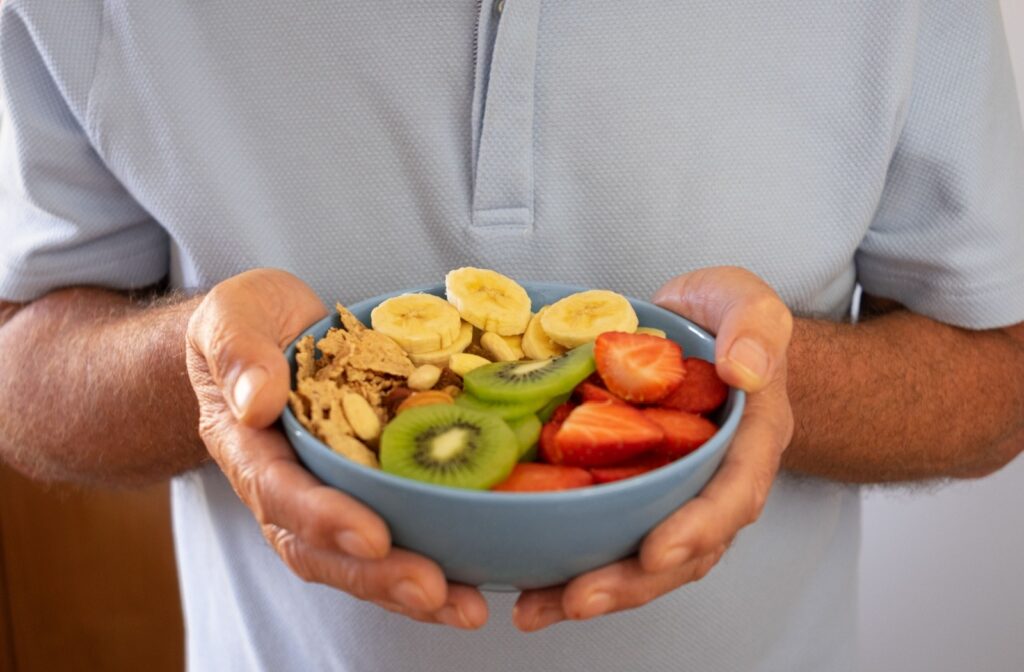Key Takeaways
- Balanced nutrition is a valuable part of a holistic approach to supporting a loved one’s cognitive health.
- Eating patterns that are good for the heart, like the Mediterranean diet, also support brain function by focusing on whole foods.
- In a memory care setting, the dining experience—from the atmosphere to hydration—is just as important as the food itself.
- A mindful diet, combined with social engagement and physical activity, contributes to a person’s overall well-being.
Nutrition and Memory Care
Exploring the connection between nutrition and brain health is a journey many families and caregivers consider. As we learn more about how lifestyle choices influence long-term well-being, the role of diet in supporting cognitive function has become a key point of interest. Understanding how food can support a loved one is a positive and proactive step for those navigating this path.
While no single diet can act as a solution, focusing on balanced nutrition is a valuable part of a holistic approach to wellness. In senior living communities, thoughtful meal planning is often integrated into the daily rhythm of memory care and respite care programs. This helps residents feel their best each and every day.
The Connection Between Diet and Brain Health
The brain, like any other part of the body, relies on nutrients from the food we eat to function properly, a concept supported by extensive research on healthy aging. Certain eating habits can support overall health, which in turn benefits the brain. It’s less about a single “superfood” and more about a consistent pattern of mindful eating that empowers you to support your loved one.
Heart Health and Brain Health
A healthy heart helps maintain a steady flow of blood to the brain, delivering the oxygen and nutrients it needs. Diets that are good for the cardiovascular system are often highlighted for their potential benefits for brain health. And eating patterns that include a variety of whole foods can support circulation and overall wellness.
How Food Choices May Offer Support
A diet rich in vitamins and antioxidants can help protect the body’s cells from stress. When planning meals, focusing on a colorful plate of whole foods is a simple way to incorporate a wide range of nutrients. This approach is a cornerstone of many nutritional plans within senior living environments.
Exploring Brain-Friendly Eating Patterns
Several dietary patterns have been explored for their potential to support cognitive health. These approaches all share common themes. They emphasize whole foods, healthy fats, and lean proteins while limiting processed items and added sugars. This nutritional focus is a key component in distinguishing between different types of senior living, such as in memory care versus assisted living, where dietary needs can be quite specific.
The Mediterranean Diet
This approach is inspired by the traditional eating habits of countries bordering the Mediterranean Sea. It’s not a formal diet but a style of eating that is both enjoyable and easy to follow. It includes:
- Plenty of fruits and vegetables
- Whole grains, beans, and nuts
- Olive oil as a primary source of fat
- Fish and other seafood
- Limited amounts of red meat and sweets
The MIND And DASH Diets
The MIND diet combines principles from the Mediterranean diet and the DASH (Dietary Approaches to Stop Hypertension) diet. It places a special emphasis on green leafy vegetables and berries. The DASH diet was originally developed to support healthy blood pressure, which aligns with the idea that heart health and brain health are connected.

Key Foods and Nutrients To Consider
Focusing on specific food groups can make it easier to build a balanced plate for your loved one. These components are frequently found in the eating patterns mentioned above. And they are simple to incorporate into daily meals, whether at home or in a supportive memory care setting.
Healthy Fats
Not all fats are created equal. Unsaturated fats, like those found in olive oil, avocados, nuts, and certain types of fish, are a beneficial part of a balanced diet. Fish such as salmon and tuna are good sources of omega-3 fatty acids, which play a role in brain function.
Colorful Fruits and Vegetables
Fruits and vegetables are packed with vitamins and antioxidants that support the body’s natural defense systems. Berries and leafy greens like spinach and kale are often mentioned for their nutrient density. Including a wide variety of colorful produce, from bell peppers to sweet potatoes, helps provide a broad spectrum of nutrients.
Foods to Approach with Moderation
A balanced diet also involves being mindful of certain foods. Limiting intake of foods with in added sugar, salt, and saturated fats is a common recommendation for general health. This includes many processed snacks, sugary drinks, and fried items.
Nutrition Strategies in a Memory Care Setting
When you consider what to expect from memory care services, nutrition involves more than just the food on the plate. It includes creating a positive and supportive dining experience that addresses unique needs. Thoughtful senior living communities recognize these challenges and adapt their programs accordingly.
Addressing Appetite Changes
It’s not uncommon for individuals with dementia to experience changes in appetite or weight loss. Care teams can help by offering nutrient-dense foods in smaller, more frequent meals. Focusing on familiar, well-liked foods and honoring personal preferences can also encourage eating and bring a sense of comfort.
Creating a Supportive Mealtime Environment
The dining atmosphere plays a big part in a person’s mealtime experience. A calm, social, and unhurried setting can make meals more enjoyable and reduce potential stress. Simple things like using contrasting colors for plates and placemats can also help residents distinguish their food more easily.
The Importance of Hydration
Staying hydrated is foundational for overall health, and it’s especially important for cognitive function. Even mild dehydration can affect concentration and energy levels. Encouraging regular fluid intake throughout the day is a simple yet meaningful part of quality memory care and professional respite care.
A Holistic Approach to Well-Being and Cognitive Health
Nutrition is a powerful tool, but it’s just one part of a comprehensive approach to supporting cognitive health. When combined with other positive lifestyle factors, a balanced diet can contribute to a higher quality of life. Lifestyle elements that complement a healthy diet include:
- Regular physical activity, like gentle movement and guided exercise that supports circulation and well-being.
- Social engagement through participation in community events and activities, and maintaining connections with friends and neighbors.
- Cognitive stimulation from hobbies, music, art, and activities that engage the mind in an enjoyable way.
See How Our Person-First Approach Nurtures Every Resident
Ultimately, a focus on nutrition provides a positive way for families and caregivers to offer support. By understanding these principles, you can make informed choices for your loved one. These choices contribute to their overall well-being and sense of self.At Liana of Venice, we believe in a person-first approach that includes thoughtful nutrition and a supportive lifestyle. Our team is dedicated to creating a vibrant and nurturing atmosphere for every resident. If you’d like to learn more about our unique approach to memory care, we invite you to connect with us and schedule a tour.




